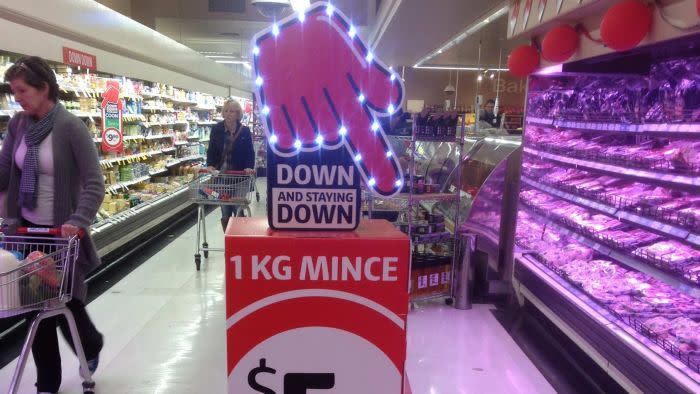The supermarket that Australian customers love the most
When it comes to the weekly grocery shop, loyalty is extremely important to Australian customers.
A recent survey conducted by Canstar Blue found that one in every two Aussie shoppers was loyal to a single supermarket chain.
The consumer research business found that familiarity with a supermarket’s layout and ease of finding items made 68 per cent of those surveyed loyal to the one chain.
Reward points and availability of superior home brand products also contributed to Aussies sticking with the supermarket of their choice.
Related: The rise and rise of Australian supermarkets

Convenience scored big on the satisfaction survey too, with a surprising 46 per cent of shoppers ranking proximity of a supermarket above value for money.
These shoppers believed that while they could be getting their groceries cheaper at a different supermarket, the convenience of the one they frequented was a bigger reason to remain loyal.
Canstar Blue also ranked the major Australian supermarkets based on factors such as value for money, customer service, variety of products, freshness of food, deals, and store layout.

Aldi emerged as the no.1 choice, outranking archrivals Coles and Woolworths on the overall satisfaction scale.
It also scored the highest for offering the customer value for money and great deals/specials on its products.
This ranking underscores the position of Aldi as being a potential disruptor in a market that’s traditionally been a Coles-Woolies duopoly.
While many of the competing supermarket brands tallied top ratings, only Aldi secured five stars in the area of overall satisfaction.
Coles came in next, tied with others in the overall satisfaction ranking, but scoring the highest on customer service, quality of products, and surprise surprise, freshness of food!
However, the supermarket that claims to offer competitive price deals scores the lowest on the deals/specials scale.

Foodland customers were most satisfied with the service of their supermarket, store layout and the freshness of the fruit, meat and veg.
IGA scored four-star ratings for overall satisfaction, customer service, product variety, store layout and freshness of produce and foods.
Canstar points out that while IGA doesn’t produce an identical shopping experience across all its stores and creates each one to the community it serves, it still delivers “everything you’ll need for the week ahead”.
Related: Woolworths warned it's not a bank
The “fresh food people” at Woolworths also scored well in the survey, finishing with a five-star rating for the variety of products available on shelves and another for the layout of stores.
Woolworths also received four stars for overall satisfaction, customer service, deals/specials and freshness of food. Additionally, it secured three stars for value for money.
These figures were drawn from a survey of 2500 Australians on their supermarket shopping habits.
Common mistakes at the grocery store
Shoppers often waste money at the grocery store without realising it. Common mistakes include going to the supermarket without a list, grabbing the first product they see in the range, and over-shopping.
Some of the other common mistakes:
1. Visiting the grocery store once a week:
Bulk shopping can be a great exercise in saving but not necessarily when it comes to perishable food items. Stocking up the shopping trolley with kilos of food in the hope of it lasting for a month only leads to wastage as most items have a limited shelf life. If you must bulk-shop for perishables, make sure you freeze whatever you don’t plan to use. This will make both your shopping and your dollar go farther.
2. Being a slave to a recipe:
Instead of buying every item on a long recipe list, think about ingredients you already have and could swap in. Lime juice and vinegar are usually good swaps in savoury recipes.
3. Not doing the math:
Should you buy pre-packaged or loose? Home brand or big brand? Melissa d’Arabian, Food Network host and author of the best-selling book Ten Dollar Dinners says, “Take 10 seconds to do some quick math to determine the per-kilo price of a package before deciding whether to buy loose or packaged”. Usually, potatoes and carrots are cheaper packaged, while mushrooms, apples, and oranges are cheaper by themselves.
4. Shopping at the wrong hour:
Shopping when you’re starving is a bad idea – temptation to stock up on almost everything you see in the food aisle is generally very strong on an empty-stomach condition.
However, health coach Katie Hill argues that shopping on too full a stomach can also backfire. In an article on Huffington Post, Hill says people who go out shopping after eating a full meal (read stuffed to the gills) buy absolutely nothing edible. “While they are stocked on paper towels and soap, they end up back at the store the next day for some actual food. The best strategy is to build your list and go to the store when you are neither too full nor too empty. Take the middle path.”
5. Not knowing the prices of the things you buy most:
In order to shop smarter, you need to know how much essential items like chicken breasts, milk, or toilet paper cost normally. That will help you spot a bargain at the store. Make a list of the items you buy most so you can stock up when there's a sale.

 Yahoo Finance
Yahoo Finance 